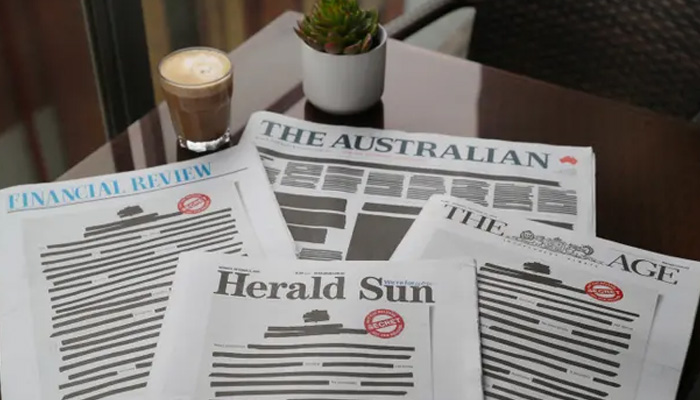TRENDING TAGS :
Newspapers in Aus leave front pages black to fight against secrecy laws
Almost every newspaper in Australia left its front pages blacked out on Monday as a step of a campaign against government secrecy and legislation that puts reporting and press freedom at risk.
Lucknow: Almost every newspaper in Australia left its front pages blacked out on Monday as a step of a campaign against government secrecy and legislation that puts reporting and press freedom at risk.
https://twitter.com/bencubby/status/1185884220847095808
National and regional mastheads including The Australian, The Sydney Morning Herald and the Australian Financial Review hit newsstands on Monday with most of their front-page stories blacked out to give the impression it had been censored similar to how classified government documents are.
Advertisements have also been rolled out across the country's television networks, asking viewers: "When the government hides the truth from you, what are they covering up?"
The protest is designed to put public pressure on the government to exempt journalists from laws restricting access to sensitive information, enact a properly functioning freedom of information system, and raise the benchmark for defamation lawsuits.
"It's about defending the basic right of every Australian to be properly informed about the important decisions the government is making in their name," Hugh Marks, chief executive of Nine said in a statement.
Australia has no constitutional safeguards for free speech. The government added a provision to protect whistleblowers when it strengthened counter-espionage laws in 2018, although media organisations say press freedoms remain restricted.
Australia's Communications Minister Paul Fletcher was not immediately available for comment on Monday. The government has previously said press freedom was a "bedrock principle".
https://twitter.com/AnthDeCeglie/status/1185893149010317312
News Corp Australasia executive chairman Michael Miller said people "should always be suspicious of governments that want to restrict their right to know what's going on".
Newsroom raids
Global attention turned to media freedoms in Australia this year when a court order prevented media from reporting that the former Vatican treasurer, Cardinal George Pell, had been found guilty on child sex abuse charges.
Some Australian outlets reported that an unidentified person had been convicted but some foreign media companies identified Pell because they were outside Australia's jurisdiction.
Prosecutors are now seeking fines and jail sentences for three dozen Australian journalists and publishers for their coverage of the trial. Pell is appealing against his convictions.
The subject came to a boil again in June when police raided the head office of the ABC in Sydney and the home of a News Corp editor on suspicion of receiving national secrets.
The raids, which involved police examination of about 9,000 computer files at the ABC and sifting through the female News Corp editor's underwear drawer, drew international condemnation.
Sources said at the time the raid on its office was in relation to 2017 stories about accusations of military misconduct in Afghanistan. News Corp has said the raid on its employee concerned an article about government plans to spy on Australians' emails, text messages and bank accounts.
Under intense pressure, the government issued a directive to the Commonwealth Director of Public Prosecutions in September that will require permission from Attorney General Christian Porter to approve any charges against journalists.
https://twitter.com/withMEAA/status/1186015556106801152



